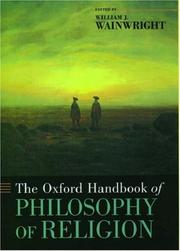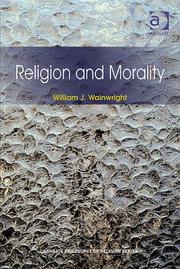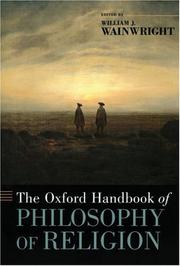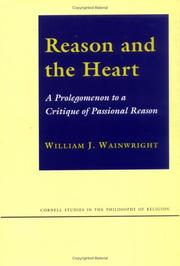| Listing 1 - 10 of 18 | << page >> |
Sort by
|

ISBN: 0195138090 0199835349 0198031580 9786611196684 1281196681 1435618556 9780195138092 Year: 2005 Volume: *3 Publisher: Oxford Oxford University Press
Abstract | Keywords | Export | Availability | Bookmark
 Loading...
Loading...Choose an application
- Reference Manager
- EndNote
- RefWorks (Direct export to RefWorks)
The second half of the 20th-century was an especially fruitful period, seeing new developments in logic and epistemology to mount both sophisticated defences of, and attacks on, religious claims. Each chapter of this handbook is representative of a distinct viewpoint related to these issues.
Religious studies --- Religion --- Philosophy. --- Philosophy --- #GGSB: Godsdienstfilosofie --- 21*01 --- Godsdienstfilosofie: christelijke religie: filosofisch en rationeel --- 21*01 Godsdienstfilosofie: christelijke religie: filosofisch en rationeel --- Godsdienstfilosofie --- Religion - Philosophy. --- Religion - Philosophy --- philosophy of religion

ISBN: 0754616320 0754616312 Year: 2005 Publisher: Aldershot Ashgate
Abstract | Keywords | Export | Availability | Bookmark
 Loading...
Loading...Choose an application
- Reference Manager
- EndNote
- RefWorks (Direct export to RefWorks)
Christian moral theology --- General ethics --- Religious studies --- Religion and ethics. --- Religion and ethics --- Ethics and religion --- Ethics
Book
ISBN: 0824098498 9780824098490 Year: 1978 Volume: 3 Publisher: New York (N.Y.): Garland
Abstract | Keywords | Export | Availability | Bookmark
 Loading...
Loading...Choose an application
- Reference Manager
- EndNote
- RefWorks (Direct export to RefWorks)
Religion --- Philosophy --- Bibliography --- 21*01 --- -Religion, Primitive --- Atheism --- God --- Irreligion --- Religions --- Theology --- Godsdienstfilosofie: christelijke religie: filosofisch en rationeel --- -Bibliography --- -Godsdienstfilosofie: christelijke religie: filosofisch en rationeel --- 21*01 Godsdienstfilosofie: christelijke religie: filosofisch en rationeel --- -21*01 Godsdienstfilosofie: christelijke religie: filosofisch en rationeel --- Religion, Primitive --- Philosophy&delete& --- Religion - Philosophy - Bibliography

ISBN: 9780195331356 0195331354 Year: 2007 Publisher: Oxford : Oxford University Press,
Abstract | Keywords | Export | Availability | Bookmark
 Loading...
Loading...Choose an application
- Reference Manager
- EndNote
- RefWorks (Direct export to RefWorks)
The second half of the 20th-century was an especially fruitful period, seeing new developments in logic and epistemology to mount both sophisticated defences of, and attacks on, religious claims. Each chapter of this handbook is representative of a distinct viewpoint related to these issues.
Religion --- Philosophy. --- Philosophy --- Philosophie --- Religion - Philosophy. --- Religion - Philosophy --- Philosophie de la religion

ISBN: 1315244772 1281097764 9786611097769 0754682323 9780754682325 1351905066 9781351905060 0754616312 9780754616313 0754616320 9780754616320 6611097767 1409476979 135190504X 1351905058 9781315244778 9781281097767 6611097767 9781351905053 1351905058 9781351905046 Year: 2005 Publisher: Aldershot, England Burlington, VT Ashgate
Abstract | Keywords | Export | Availability | Bookmark
 Loading...
Loading...Choose an application
- Reference Manager
- EndNote
- RefWorks (Direct export to RefWorks)
Religion and Morality addresses central issues arising from religion's relation to morality. Part one offers a sympathetic but critical appraisal of the claim that features of morality provide evidence for the truth of religious belief. Part two examines divine command theories, objections to them, and positive arguments in their support. Part three explores tensions between human morality, as ordinarily understood, and religious requirements by discussing such issues as the conflict between Buddhist and Christian pacifism and requirements of justice, whether ""virtue"" without a love of God i

ISBN: 1501717324 9781501717321 0801431395 9780801431395 9780801473487 Year: 1995 Publisher: Ithaca, N.Y. Cornell University Press
Abstract | Keywords | Export | Availability | Bookmark
 Loading...
Loading...Choose an application
- Reference Manager
- EndNote
- RefWorks (Direct export to RefWorks)
Between the opposing claims of reason and religious subjectivity may be a middle ground, William J. Wainwright argues. His book is a philosophical reflection on the role of emotion in guiding reason. There is evidence, he contends, that reason functions properly only when informed by a rightly disposed heart.The idea of passional reason, so rarely discussed today, once dominated religious reflection, and Wainwright pursues it through the writings of three of its past proponents: Jonathan Edwards, John Henry Newman, and William James. He focuses on Edwards, whose work typifies the Christian perspective on religious reasoning and the heart. Then, in his discussion of Newman and James, Wainwright shows how the emotions participate in non-religious reasoning. Finally he takes up the challenges most often posed to notions of passional reason: that such views justify irrationality and wishful thinking, that they can't be defended without circularity, and that they lead to relativism. His response to these charges culminates in an eloquent and persuasive defense of the claim that reason functions best when influenced by the appropriate emotions, feelings, and intuitions.
Subjectivity --- Faith and reason --- Faith and reason. --- Faith and logic --- Logic and faith --- Reason --- Reason and faith --- Reason and religion --- Religion and reason --- Religious aspects --- Christianity. --- Religious aspects. --- James, William, --- Newman, John Henry, --- Edwards, Jonathan, --- Subjectivism --- Knowledge, Theory of --- Relativity --- Christianity --- Religious aspects&delete& --- Newman, John Henry --- Dzhems, Uilʹi︠a︡m, --- Jaymz, Vīlyām, --- جىمز، وىلىام --- أدوردس، يوناثان --- Philosophical anthropology --- Theory of knowledge --- Religious studies
Book
ISBN: 1108761372 1108786960 1108708099 1108781977 Year: 2020 Publisher: Cambridge : Cambridge University Press,
Abstract | Keywords | Export | Availability | Bookmark
 Loading...
Loading...Choose an application
- Reference Manager
- EndNote
- RefWorks (Direct export to RefWorks)
This Element examines aspects of monotheism and hope. Distinguishing monotheism from various forms of nontheistic religions, it explores how God transcends the terms used to describe the religious ultimate. The discussion then turns to the nature of hope and examines how the concept has been used by Augustine, Aquinas, Kierkegaard, and Moltmann, among others. The Christian tradition to which these monotheists belong associates hope and faith with love. In the final section, Wainwright shows the varieties of this kind of love in Islam, Christianity, and theistic Hinduism, and defends the sort of love valorized by them against some charges against it. He examines why the loves prized in these traditions are imperfect because their adherents invariably believe that the love that they cherish is superior to that cherished by others.
Monotheism. --- Hope --- Pantheism --- Religion --- Theism --- Trinity --- Polytheism --- Religious aspects.
Book
ISBN: 1316484955 1107477115 1316481948 1107062403 1107650364 Year: 2016 Publisher: Cambridge : Cambridge University Press,
Abstract | Keywords | Export | Availability | Bookmark
 Loading...
Loading...Choose an application
- Reference Manager
- EndNote
- RefWorks (Direct export to RefWorks)
Reason, Revelation, and Devotion argues that immersion in religious reading traditions and their associated spiritual practices significantly shapes our emotions, desires, intuitions, and volitional commitments; these in turn affect our construction and assessments of arguments for religious conclusions. But far from distorting the reasoning process, these emotions and volitional and cognitive dispositions can be essential for sound reasoning on religious and other value-laden subject matters. And so western philosophy must rethink its traditional antagonism toward rhetoric. The book concludes with discussions of the implications of the earlier chapters for the relation between reason and revelation, and for the role that the concept of mystery should play in philosophy in general, and in the philosophy of religion and philosophical theology in particular.
Philosophy and religion. --- Inference. --- Reasoning. --- Argumentation --- Ratiocination --- Reason --- Thought and thinking --- Judgment (Logic) --- Logic --- Ampliative induction --- Induction, Ampliative --- Inference (Logic) --- Reasoning --- Christianity and philosophy --- Religion and philosophy --- Religion
Book
ISBN: 029908910X Year: 1981 Publisher: Madison (Wis.): University of Wisconsin press
Abstract | Keywords | Export | Availability | Bookmark
 Loading...
Loading...Choose an application
- Reference Manager
- EndNote
- RefWorks (Direct export to RefWorks)
Book
Year: 1978 Publisher: New York, London Garland
Abstract | Keywords | Export | Availability | Bookmark
 Loading...
Loading...Choose an application
- Reference Manager
- EndNote
- RefWorks (Direct export to RefWorks)
| Listing 1 - 10 of 18 | << page >> |
Sort by
|

 Search
Search Feedback
Feedback About UniCat
About UniCat  Help
Help News
News